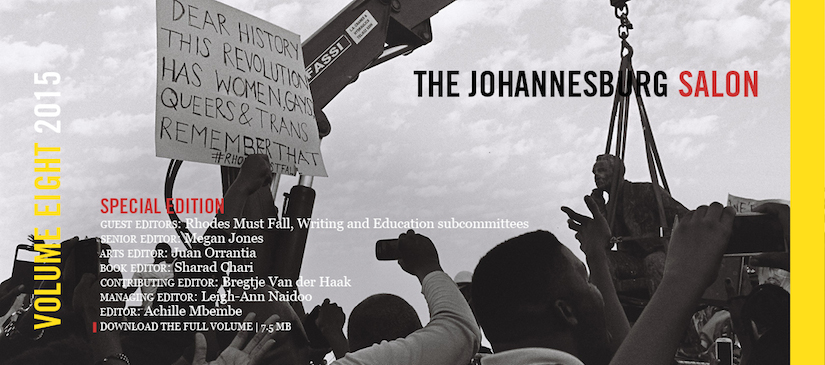This special volume, guest edited by RhodesMustFall, provides the first ‘live archive’ of a movement born at the University of Cape Town that has now reached other South African campuses and is clamoring for the decolonization of knowledge and of the university. Twenty years after the formal ending of Apartheid, South Africa has reached the kind of threshold so vividly foreseen by Frantz Fanon in his famous chapter, “Pitfalls of national consciousness” (The Wretched of the Earth). As the former national liberation movement – now the ruling party – keeps extolling the virtues of accommodationism, a massive anger, even rage, is mounting especially among the ‘born free’ and the multitudes of the disenfranchised.
Did things have to come to this? How can we explain the persistence of white supremacist attitudes in almost every sector of life? What does it mean to be black in post-Apartheid South Africa? Is the post- in ‘post-Apartheid’ the same as the post in ‘postcolonial’? Shouldn’t we be thinking, rather, in terms of ‘decolonization’? How would a decolonized university look like once the strictures of Eurocentrism are destroyed?
This, and many other such complex issues are taken up in this volume which retraces the events on UCT campus by some of those who were involved in them. In a dazzling variety of voices, styles and genres, they tease out the meanings of their acts and highlight its constitutive nature in the present as well as in the future. The volume also includes original photos, poetry, handwritten notes. It directly speaks to questions that are international – new norms of the racial, the relation between critique and institutions, knowledge, power and (mis)representation, gender, sexuality and agency, and more importantly the politics of the future in an age of racial violence and cynicism.
Guest edited by RhodesMustFall, it includes the first “live archive’ of the movement that shook the University of Cape Town and triggered a national debate on the unfinished business of liberation, the politics of black anger, the ways to bring white supremacy to its knees and to usher a radical new era of decolonization.
Current features include: The piece framing the volume Salon for What? by the Gamedze’s; the collaboratively written introductory poem titled The Black Imagination by the RMF Writing and Education Subcom; Brian Kamanzi’s poems on Where to now? and Hyperreality in the Colonised World; Khumo Sebambo’s poem Little boy’s got black on his skin and his ‘colonised’ writing on Azania House as a symbol of the black imagination, Mbali Matandela’s poems Letting go of the Blues, Soul-Searching in a Burning Room of Revolutionaries, her handwritten notes titled Used your Imagination, and her reflection on stagnant debates, stagnant minds; Ameera Conrad’s poems on exhaustion over a lack of understanding and The Fall; Thuli Gamedze on Azania-House Intersectionality as a Catalyst for Black Imagination, the untitled black imaginings, and her handwritten notes titled Notes on Imagination; Ernie Koela’s poem set to music and images on the Patriarch’s Empty Draw and Apples of my Eye Cry Dry, and his reflection on Liberals and Consciousness as well as how the History of the Black Body has been Exoticised and Fetishised in a Pornographic Fashion; Ntebaleng Morake on civil war in her house and why decolonising UCT is imperative; Themba Msimang on Afrophobia; Mmamalema Molepo poems on Freedom and Monsters; Lufuno Ramadwa’s poem Stain; Shabashni Moodley’s Azania House Diaries; oNe sTab’s poem The Black Imagin(ed)nation, images of his decolonised notes and his reflection on UCT, its orientation programmes and the reproduction of white patriarchy; a photo essay by Wandile Kasibe and Thuli Gamedze; Noluvuyo Mjoli’s diary entry on how she envisions a decolonized UCT to be like.
